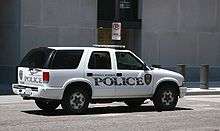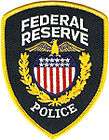Federal Reserve Police
| United States Federal Reserve Police | |
|---|---|
|
Patch of the United States Federal Reserve Police | |
| Motto | Protecting the nation's economy |
| Agency overview | |
| Formed | 2001 |
| Legal personality | Governmental: Government agency |
| Jurisdictional structure | |
| Federal agency (Operations jurisdiction) | United States |
| Legal jurisdiction | Nationwide |
| Constituting instrument | United States Code Title 12 Chapter 3 Part II Section 248(q) |
| General nature | |
| Operational structure | |
| Sworn members | 1,000+ |
| Parent agency | United States Federal Reserve System |
| Facilities | |
| Stations | 37 |
The U.S. Federal Reserve Police is the law enforcement arm of the Federal Reserve System, the central banking system of the United States. The Federal Reserve Board Police in Washington, D.C., is not part of the same entity as Federal Reserve System Law Enforcement Units located in the 12 districts (covering all 50 states) throughout the nation.
History
Federal Reserve System Law Enforcement Officers derive their authority from Section 11(q) of the Federal Reserve Act, codified at 12 U.S.C. § 248(q). Federal Reserve officers have the same authority as any other Federal Law Enforcement Officer while on duty, regardless of their geographic location.
Prior to designation as Federal Law Enforcement Officers, system protection personnel operated as protection or special police officers in their respective states and were generally regulated to exercising authority on Federal Reserve Property, with variances dependent on specific district regulations. Prior to Federal Law Enforcement designation, there were no plainclothes or specialized units in the system.
Following the passage of updated legislation by Congress after the events of September 11, 2001, which designated Federal Law Enforcement Authority to system officers, authority now extends to wherever a Federal Reserve Law Enforcement Officer is performing official duties, whether in uniform, plainclothes, or in a specialized unit.
Functions
Each Federal Reserve Law Enforcement Office in the 12 regional districts are independent law enforcement units, though governed loosely out of Washington, D.C. Many of the law enforcement districts have dual City or State Police authority in addition to their Federal authority. This separate authority allows for the enforcement of state and/or city laws, in addition to the Federal Code.
The primary duty of uniformed division officers is to provide general law enforcement and force protection services to Federal Reserve facilities, whether owned or leased. Other than administrative matters and violations of Federal Reserve Bank regulations, Federal Reserve Officers respond to police, fire and medical incidents in and adjacent to their assigned facilities to protect life, render aid or assist other law enforcement. Each Federal Reserve office operates a 24/7 emergency communications (command) center.
Each district has a dignitary protection team, which provide armed plainclothes protection to the 12 Federal Reserve Presidents. There are five Special Response Teams (SRT) based in San Francisco, Minneapolis, Atlanta, Richmond, as well as New York City, which are designed to respond nationwide. Additionally, Explosive Detector Dog teams, Active Shooter/Patrol Rapid Response teams and Hazardous Materials teams are assigned to several Federal Reserve districts throughout the nation, often traveling to other regions on temporary assignments.
Equipment
Officers are certified to carry a variety of weapons systems, including semi-automatic pistols, assault rifles, submachine guns, shotguns, less-lethal weapons, pepper spray, batons and other standard police equipment. Officers also wear bulletproof vests and body armor.

On October 12, 2010, President Barack Obama signed into law S.B. 1132 the "Law Enforcement Officers' Safety Act Improvements Act", which states that law enforcement officers of the Federal Reserve are "qualified law enforcement officers" and thus are authorized to carry a firearm off-duty. This update to the Law Enforcement Safety Act, among other aspects, clarified that Federal Law Enforcement Officers working for Amtrak and the Federal Reserve (not funded by Congress) are specifically granted the same rights as publicly funded law enforcement officers as it relates to off-duty concealed carry.
Each district can choose the make, model and style of police vehicles, which vary based on location and weather. There are both marked and unmarked police cars in the Federal Reserve fleet.
Employment
Federal Reserve Law Enforcement Officers must complete basic training at one of the regional Federal Reserve Police training centers, which are nationally accredited by the Federal Law Enforcement Training Centers (FLETC). All Federal Reserve Police Instructors are certified by FLETC or Peace Officer Standards and Training (POST). The Federal Reserve System runs regional FLETC-accredited training academies throughout the nation. In some districts, where officers are cross-designated as local–state law enforcement officers, additional training is provided to comply with the governing POST. Some (but not all) districts offer a lateral entry program that allows certification with minimal training for those with prior police training and experience.
Because the Federal Reserve System is independent of the federal government, Federal Reserve Law Enforcement officers have a benefit system separate from, but similar to, public federal employees. Each district has a different pay scale based on the local cost of living index and provides compensation packages comparable to other law enforcement officers in the area. System officers are provided a fully paid (non-contribution) defined pension plan, in addition to a matching thrift savings program.
Fallen officers
Since the establishment of the Federal Reserve Police, two officers and one K9 have died while on duty.[1]
See also
References
- ↑ "U.S. Government Line of Duty Deaths". The Officer Down Memorial Page (ODMP). Retrieved 2016-07-10.
Sources
- Federal Reserve Police Accreditation (FLETA)
- Federal Reserve Police and other Federal Agencies FLETA Accreditation
- Federal Reserve Police Recruiting page
